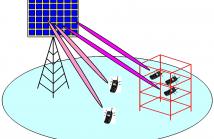
The IEEE Global Conference on Signal and Information Processing (GlobalSIP) is a flagship conference of the IEEE Signal Processing Society. GlobalSIP'15 will be held in Orlando, Florida, USA, December 14-16, 2015. The conference will focus on signal and information processing with an emphasis on up-and-coming signal processing themes. The conference will feature world-class speakers, tutorials, exhibits, and sessions consisting of poster or oral presentations. Outstanding papers will be selected for Best Paper Awards or Best Student Paper Awards; a paper is eligible for a best student paper award if the first author of the paper is a student. IEEE Signal Processing Society and National Science Foundation will provide travel grants to eligible students.
- Read more about Ergodic Rate Analysis for Massive MIMO Relay Systems with Multi-Pair Users under Imperfect CSI
- Log in to post comments
- Categories:
 10 Views
10 Views- Read more about A Novel Physical Layer Spoofing Detection Based on Sparse Signal Processing
- Log in to post comments
In wireless communication systems, spoofing attack significantly impact the information security, for this attack is not hard to launch with little effort. Although traditional cryptographic authentication can be utilized for node identification, it is not desirable in some low power requirements application scenarios such as Wireless Sensor Networks (WSNs). In this paper, we formulate this problem as one of sparse signal processing. In order to identify the existence of the spoofing attacker, we explore using the feature extraction and fusion
- Categories:
 13 Views
13 Views- Read more about Accurate Carrier Frequency Offset Estimation in Time-Reversal Communications
- 1 comment
- Log in to post comments
Time-reversal (TR) wideband communication could harvest the energy from the rich-scattering environment and enjoy the unique spatial and temporal focusing effect. However, the performance degrades in the presence of carrier frequency offset (CFO), which introduces an additional phase linear in time. CFO estimators could mitigate its effect. Yet, conventional CFO estimators cannot work well regarding the tiny CFO due to the high sampling rate in wideband TR systems. To address this issue, we propose four CFO estimators which are capable to estimate very small CFO with very high accuracy.
- Categories:
 20 Views
20 Views- Read more about Recursive Filters with Bayesian Quadratic Network Game Fusion
- Log in to post comments
Distributed filter in networks mainly involves two stages, local estimation by private observation and information fusion with neighbor nodes based on the underlying topology. Since Bayesian game is a powerful tool to analyze the interaction equilibrium of multi-player with incomplete information in networks, we combine the recursive LMMSE filter with network game of quadratic utilities under the Bayesian filtering framework. In our algorithm, the nodes update their local beliefs on the unknown state by private observations and historical actions from neighbors in network.
slides.pdf
- Categories:
 9 Views
9 ViewsIn this work, we propose an improved fast multiple-view image denoising algorithm using 3D focus image stacks. It showed improved computational efficiency and comparable denoising quality compared to conventional methods.
- Categories:
 13 Views
13 Views
- Read more about DOA Estimation and Achievable Rate Analysis for 3D Massive MIMO in Aeronautical Communication Systems
- Log in to post comments
These slides are about the mean-squared error (MSE) characterization of the direction of arrival (DOA) estimation. Also, we study the effect of MSE of DOA estimation on the achievable rate of the Massive MIMO system
- Categories:
 82 Views
82 Views- Read more about Blind Non-intrusive Appliance Load Monitoring using Graph-based Signal Processing
- Log in to post comments
With ongoing massive smart energy metering
deployments, disaggregation of household's total energy consumption down to individual appliances using purely software tools, aka. non-intrusive appliance load monitoring (NALM),
has generated increased interest. However, despite the fact that
NALM was proposed over 30 years ago, there are still many
open challenges. Indeed, the majority of approaches require
training and are sensitive to appliance changes requiring
regular re-training. In this paper, we tackle this challenge by
- Categories:
 13 Views
13 Views- Read more about A Fast Parallel Matrix Inversion Algorithm based on Heterogeneous Multicore Architectures
- Log in to post comments
- Categories:
 15 Views
15 Views- Read more about An Efficient CDI Acquisition Scheme Facilitating Large Scale Antenna systems
- Log in to post comments
- Categories:
 4 Views
4 Views